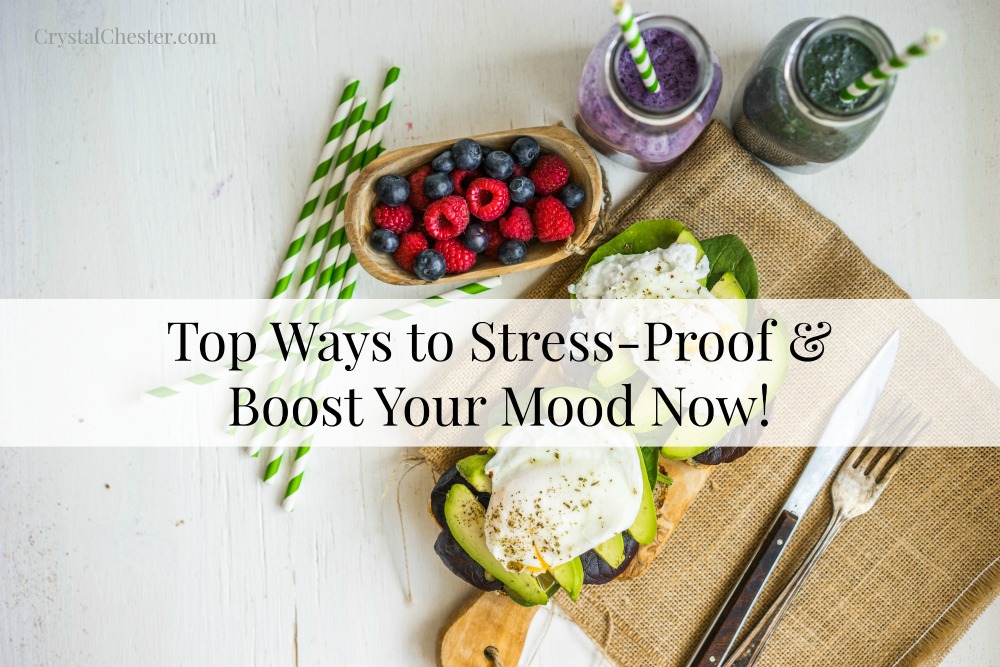Stress will stump any results you’re shooting for almost regardless of how on point your nutrition & fitness are. Many people don’t realize the damaging affect of stress on the body or they don’t know what to do about it. Some people will change their diet, they’ll exercise more but when it comes to stress, well, that can be a touchy subject.
Whether you’re looking to lose weight, improve energy, get better sleep, reduce inflammation, improve digestion, improve cognitive function, improve digestion, etc you cannot get the results you want if stress is high.
Define “High”…
On a scale of 1-5, how would you rate your average stress level? Now ask your spouse or close friend how they’d rate your average stress level. Sometimes we don’t realize the stress load we’re under but others do. Don’t take offense if the number your spouse or friend gives you isn’t want you’d expect. Allow them explain their answer and let it propel you to be better.
If your stress level is a 3 or higher, it’s time to address your (or begin a) stress management strategy.
The brain is the central command center for all processes and operations in the body. If the brain isn’t working well other body functions start to suffer. This includes but is not limited to:
- Digestion

- Inflammatory switches
- Adrenal functions
- Energy
- Circadian rhythms
- Mental clarity
- Blood sugar balance
- Hormone balance
- Cortisol levels
Stress and the Brain
When we are under stress it affects the autonomic nervous system – the system that’s in charge of all the vital bodily functions that take place without our conscious effort. This includes our heartbeat, breathing, digestion, blood circulation plus the sympathetic and parasympathetic systems.
The sympathetic nervous system, better known as “fight or flight” is what enables us to react to stress by dilating the pupils, releasing cortisol, increasing the heart rate and sending blood away from the organs to the extremities so we can flee in a dangerous situation or react to avoid a car collision.
The parasympathetic system is the preferred system – this is the “rest and digest” system, which supports good digestion, immune strength, hormone balance, etc. Someone who stays mainly in a parasympathetic state would have stable energy, normal blood pressure, digests well, and goes about life with ease without struggling with a hair-trigger response to stress.
Many Americans are all too often in the sympathetic state with deadlines, traffic, never ending emails and texts, constantly being “connected”, hectic schedules, controlling bosses, bad marriages or relationships, and so on.
In the words of Dr. Datis Kharrazian DHSc, DC, MS,
“In short, the American life is filled with tiny, stress-provoking bison charging at us all day long”.
Chronically staying in this state leads to trouble with digestion, poor memory, blood sugar imbalances, low energy, hormone dysfunction, etc, which as you can imagine only leads to more stress.
Best foods for internal stress fighters
- Dark Chocolate: real dark chocolate made from cacao beans contains 1. Anandamide: a neurotransmitter that temporarily blocks the feeling of pain and depression. And 2. Antioxidants & particularly flavonols,which have been linked to lower rates of depression. However most chocolate has been processed in such a way that reduces or blots out flavonols’ benefits. Depending on the product some chocolates have undergone fermenting, alkalizing, roasting and adding sugar & milk, which according to a study from Nutrition & Metabolism milk interferes with the absorption of flavonols. Shoot for 75% dark or higher for a healthy amount of flavonols & anandamide content to reap the benefits.
+ - Salmon & Walnuts: needed for their omega 3 fat content. One study in Brain Behavior and Immunity showed a dramatic 20% stress reduction in medical students taking omega 3 EPA & DHA. If you’re not a salmon, krill, sardines, anchovies or tuna fan or you find it difficult to eat enough this is the supplement I recommend.
+ - Green Leafy Veggies: rich green colored vegetables are high in folate, which helps our bodies produce mood-regulating neurotransmitters, such as serotonin and dopamine. A study conducted in 2012 found people who consumed the most folate had a lower risk of depression than those who ate the least. I know, it can be tough getting 4-5 servings of veggies in each day. But think smoothies. Give your morning a kickstart and your afternoons a boost with a filling and mood-boosting smoothie! Use at least a handful of spinach and/or baby kale (you can’t taste it, I promise!), 1 serving of fat (as in nuts or avocado), berries for fiber, antioxidants and a bit of sweetness plus clean protein in each smoothie to fight the blues (& the bulge).
+ - Blueberries: are stress fighters too! Blueberries and other purple/blue berries and foods contain antioxidants called anthocyanins, which help the production of dopamine, a chemical in the brain that is critical to coordination, memory function and your mood.
+ - Tumeric (curcumin) – this yellow curried spice contains curcumin, which has high levels of stress fighting antioxidants, fights to dampen inflammation (which many stress and depressive feelings arise from) & helps regulate neurotransmitters such as serotonin, norepinephrine and dopamine. How to do you use turmeric? Try it sprinkled (approx 1 tsp) on scrambled eggs or in this warm turmeric tea.
+ - Probiotics – One of the biggest secrets to improving brain function and mood lies in your gut. An imbalance of gut bacteria can be detrimental to the brain as it has been linked to issues such as anxiety and depression. These bacteria have different roles such as neurotransmitter function, regulation of hormones, blood sugar balance and an impact on brain health. Lactobacillus rhamnosus for instance was found to have a marked effect on GABA levels in certain regions of the brain and lowered the stress-induced hormone corticosterone, resulting in reduced anxiety and depression related behavior. Because we live in an antibiotic culture if I were to recommend 1 supplement to everyone it would be a probiotic because they’re that important!

Top Ways to Beat Stress
You can’t always control what stresses come at you but you can control how it affects you. Stress will always be a part of life but having soothing stress management practice as a routine can make things sail much smoother.
Unplug from media at least 1 hour before bed. Studies have show the more screen time people have the more moody, stressed and depressed they’re likely to be. Plus it’s quite common for people to “wind down” with their phones in-hand before going to bed. However circadian rhythms and melatonin are affected by light and this habit can lead to poor sleep, which as you’d guess, contributes to your stress load. What to do instead: give yourself a bed time routine and instead of scrolling through social media read a book, play a card game, make a thankful list, take a soothing bath, journal, call a friend, etc.
Upon waking up take 5 minutes to pray or mediate. Before you hit the ground running… just, be. Pray on the day ahead, let go of the things you can’t change and find enjoyment & excitement in the things you can and those things you look forward to. This starts your mind off in a very peaceful state and studies have shown that when this is done on a daily basis the brain then stays in this peaceful state longer.
A study in 2004 compared the effect of medication on 10 novice meditators and 10 Buddhist monks by evaluating their brain waves before and after meditation. Both groups were instructed to meditate on love and compassion. During the meditation 2 of the novices and all of the monks experienced a increase in the number of gamma waves, a high brainwave state associated with peace and deep meditation. However, as soon as the subjects stopped meditating all of the novices’ brain function returned normal while all of the monk’s, who had completed hundreds of hours of meditation, stayed in the gamma wave state. This showed that repeated practice of putting yourself in a peaceful mental state can carry on much longer than just in your quite time. Repetition is key as our brains are wonderfully designed to constantly build new and positive plasticity.
Visualize the perfect day after your prayer and meditation time. This is a game-changer. We all have parts of our day that we don’t look forward to. Visualize those times going well and visualize them going not so well but you reacting to them in a calm manner or in a way you’d prefer to react. For example, say, traffic into work is always hectic. Picture you sitting in bumper-to-bumper traffic & it not getting to you. Even being calm when someone cuts you off. Use great detail in your visualizations. Then when you head into work that day you’re already ready and mentally prepared for the slow trek into work & you’re less likely to get as irritated. Or maybe you have a toddler who is teething and the screaming drives you batty. Picture in great detail how the day could go with her teething and how you’d prefer to respond to soothe her. Then when a tough time hits, its like you’ve already been-there-done-that and your ready to react how you’d like. Trust me. Try it for any situation that gives you fear, stress, anxiety, etc. It works!
Make a meal plan. Nothing like wasting food and taking too many trips to the grocery store to stress you out & add more to your to-do list. It’s unnecessary.
Find Meal Planning 101 here or the brief steps are below…
- Make a list of all your favorite meals & store it in your phone (or wherever else it’s easily accessible). Ask your family and kiddos of meals they like to add to the list.
- Every week choose 3-5 days worth of meals to eat that week. Don’t try to do a whole month. Most of us don’t know what they’ll want to eat 3 days from now, much less 3 weeks away.
- Check inventory. Don’t guess here. You’ll save much time & money by taking 5 extra minutes to see what ingredients you have on hand.
- Add only 1 or 2 new recipes each week. Of course if you have more time to go for it. But for most of it, 1 or 2 is enough.
- Repeat and add new recipes as times goes on.
Fake a Smile. There is a connection between your facial expressions and brain activity. Even barely squeezing out a smirk can stimulate neurotransmitters such as serotonin and release endorphins to perk you up. According to Psychology Today smiling can relieve stress, boost the immune system, lower blood pressure, change your mood and of course be contagious. <3
References:
Kharrazian, Datis. Why Isn’t My Brain Working?: A Revolutionary Understanding of Brain Decline and Effective Strategies to Recover Your Brain’s Health. Carlsbad, CA: Elephant, 2013. Print.
Cleveland Clinic (2010), University of Alabama at Birmingham (2008), BMJ Group Partnership (2010)
Journal of Affective Disorders, May 2012, Volume 138, Issue 3, Pages 473-478
Proc Natl Acad Sci U S A. 2011 Sep 20;108(38):16050-5.
Lutz A, Greischar LL, Rawlings NB, Ricard M, Davidson RJ. Long-term mediators self-induce high-amplitude gamma synchrony during mental practice. Proc Natl Acad Sci U S A. 2004 Nov 16;101 (46):16369-73.


